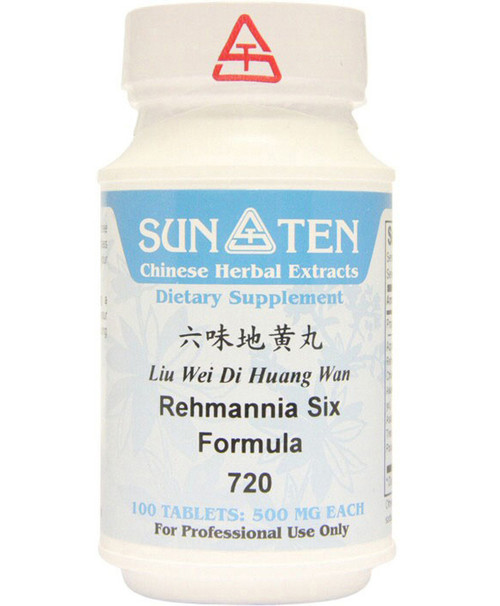
Product Description
Sun Ten Formulas Liu Wei Di Huang 100 tablets
Liu Wei Di Huang, also known as Rehmannia Six Formula nourishes the kidney and liver yin.
What Liu Wei Di Huang is Best For
Liu Wei Di Huang Wan may be used for the following symptoms:
- Backache
- Dizziness
- Ears-Ringing (Tinnitus)
- Fertility
- Sweating-Night
- Throat-Sore
- Toothache
- Thirst
- Menopause symptoms
- Pain-Entire Body
TCM Function
- Nourish kidney and liver yin
Liu Wei Di Huang Wan History
Liu Wei Di Huang Wan translates as Six Ingredient Pill with Rehmannia was formulated in the early 12th century by Qian Yi, known as the Sage of Pediatrics. In Chinese Medicine theory, the Kidneys are responsible for the growth, development, and reproduction. Therefore, children born with weak Kidneys have developmental delays and stunted growth. This formula’s original purpose was to nourish the Kidneys and promote healthy development in children. Now it is one of the most frequently prescribed formulas for a wide range of conditions.
Liu Wei Di Huang Wan Ingredient Functions
Shu Di Huang: an anti-aging herb that also relieves anemic symptoms
Shan Zhu Yu: a fruit that regulates menstrual cycle and stops abnormal fluid leakage
Shan Yao: Chinese yam boosts energy and helps with digestive and urinary conditions
Ze Xie: an herb that relieves painful urination, stops diarrhea, and reduces dizziness
Mu Dan Pi: a type of bark that clears internal heat and improves blood circulation
Fu Ling: a sweet herb that balances the digestive system and promotes mental tranquility
Liu Wei Di Huang Serving Size
2-4 tablets, two times a day
Liu Wei Di Huang Serving Size Ingredients
Concentrated powders of natural herbal products tend to absorb moisture from the air. Hence, it is necessary for the manufacturer to add a suitable amount of excipient to stabilize the concentrated herbal products. Non-GMO starch are used as excipients.
Rehmannia cured root tuber (shu di huang), Chinese yam rhizome (shan yao), Asiatic dogwood fruit without seed (shan zhu yu), Asian water plantain rhizome (ze xie), Tree peony root bark (mu dan pi), Poria sclerotium (fu ling).











